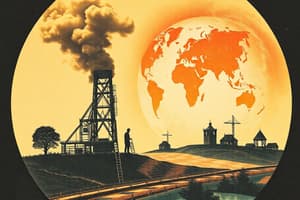Podcast
Questions and Answers
What is the primary constituent of Earth's atmosphere?
What is the primary constituent of Earth's atmosphere?
- Carbon dioxide
- Argon
- Nitrogen (correct)
- Oxygen
Which gas plays a crucial role in retaining heat in the atmosphere through the greenhouse effect?
Which gas plays a crucial role in retaining heat in the atmosphere through the greenhouse effect?
- Oxygen
- Nitrogen
- Carbon dioxide (correct)
- Argon
How much of Earth's atmosphere is composed of oxygen?
How much of Earth's atmosphere is composed of oxygen?
- 21% (correct)
- 78%
- 10%
- 1%
What is the role of Earth's atmosphere in protecting the planet from cosmic radiation?
What is the role of Earth's atmosphere in protecting the planet from cosmic radiation?
How did the atmosphere form on Earth?
How did the atmosphere form on Earth?
What allows the atmosphere to maintain a stable balance, largely independent of the sun?
What allows the atmosphere to maintain a stable balance, largely independent of the sun?
What is the primary function of the atmosphere in relation to solar ultraviolet radiation?
What is the primary function of the atmosphere in relation to solar ultraviolet radiation?
Why is it crucial to strike a balance in the amount of UV radiation reaching the Earth?
Why is it crucial to strike a balance in the amount of UV radiation reaching the Earth?
What factors contribute to the creation of complex weather systems on Earth?
What factors contribute to the creation of complex weather systems on Earth?
How does climate differ from weather?
How does climate differ from weather?
What contributes significantly to air pollution according to the text?
What contributes significantly to air pollution according to the text?
In what way can air pollution pose a threat to the atmosphere and climate?
In what way can air pollution pose a threat to the atmosphere and climate?
Flashcards are hidden until you start studying
Study Notes
Exploring the Atmosphere: Our Subtle, Yet Crucial Envelope
The atmosphere is a marvelous, intricate dance of gases that cloaks our planet. It's an invisible shield that not only protects us from cosmic radiation but also allows for life's existence on Earth. In this exploration, we'll delve into the essentials of our atmosphere, its composition, and the critical roles it plays in maintaining our planet's delicate balance.
Atmosphere's Composition
The atmosphere's primary constituent is nitrogen, accounting for approximately 78% of the mixture. Oxygen, our breath's life-sustaining component, makes up around 21%. The remaining 1% is a combination of other gases like argon, carbon dioxide, and trace amounts of water vapor, methane, and various compounds.
Formation and Evolution
The atmosphere formed from a combination of gas and vapor released during volcanic activity, as Earth cooled following its formation. The composition has evolved over time through various geological processes, such as weathering, erosion, and the exchange of gases with the crust and oceans. Today, our atmosphere is a dynamic, self-regulating system that maintains a stable balance, largely independent of the sun.
Atmosphere's Functions
One of the atmosphere's most crucial functions is to retain heat. The greenhouse effect, a natural process, happens when gases like carbon dioxide and water vapor absorb and re-emit infrared radiation, keeping the planet's temperature warm enough to support life.
The atmosphere also filters out solar ultraviolet radiation, protecting life from harmful UV rays. It's a delicate balance, as too much UV radiation could lead to ozone depletion and health hazards, while too little would prevent photosynthesis and disrupt the food chain.
Weather and Climate
The atmosphere is a dynamic force that drives weather patterns and facilitates climate change. Air pressure, temperature, humidity, and air masses combine to create the complex weather systems we see on Earth. Climate, on the other hand, is the long-term average of weather conditions over a specific region, influenced by factors such as ocean currents, landform, and atmospheric composition.
Air Pollution
Unfortunately, human activities, such as the burning of fossil fuels and deforestation, have led to air pollution. This pollution can have detrimental effects on our health, the atmosphere, and the climate. Air pollution is a multifaceted issue that requires concerted efforts from governments and individuals to mitigate and reverse.
Conclusion
The atmosphere is an intricate, interwoven system that plays a critical role in maintaining life on Earth. It's a dynamic, self-regulating environment that requires our care and attention if we are to preserve the delicate balance that makes life possible. With a better understanding of our atmosphere, we can make informed decisions about our future and protect the planet for generations to come.
Studying That Suits You
Use AI to generate personalized quizzes and flashcards to suit your learning preferences.




